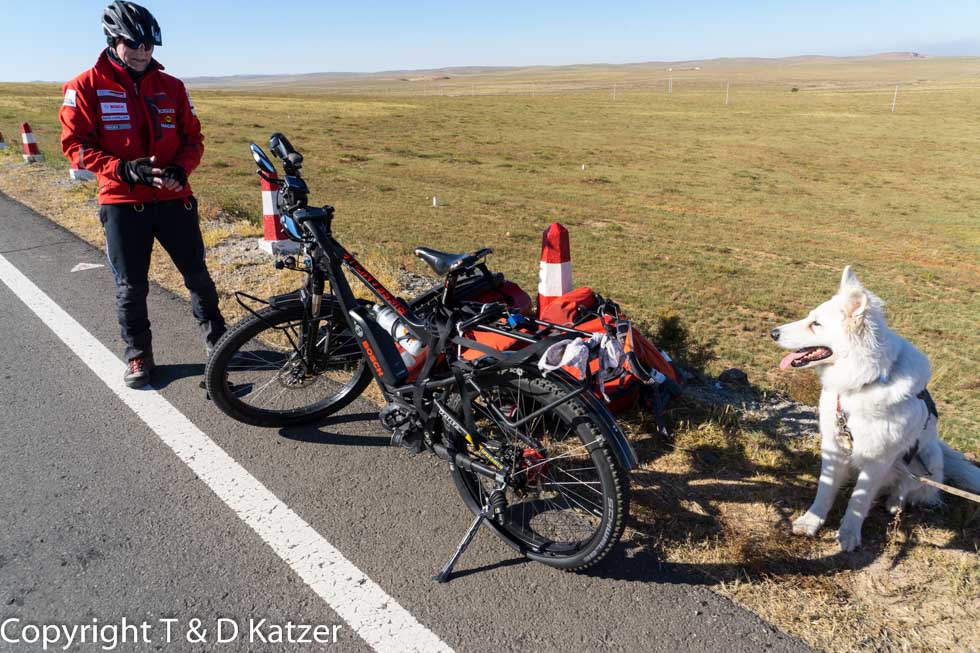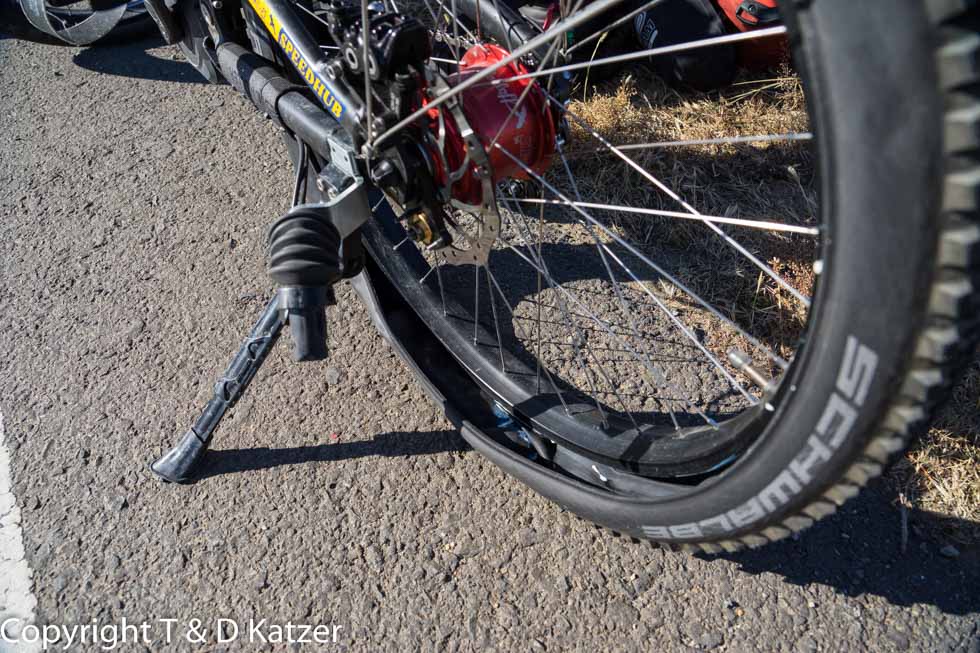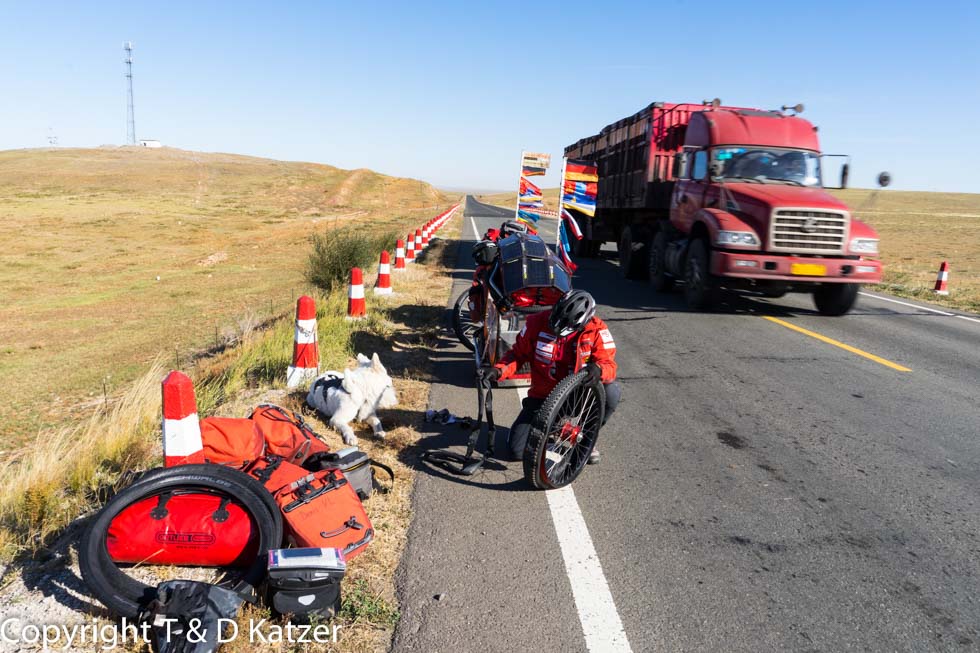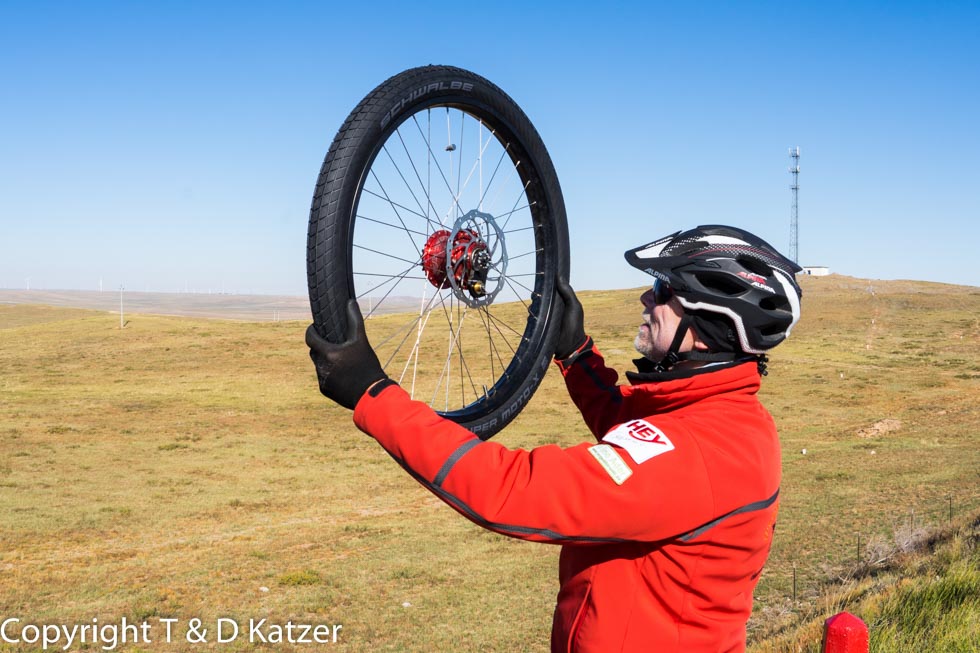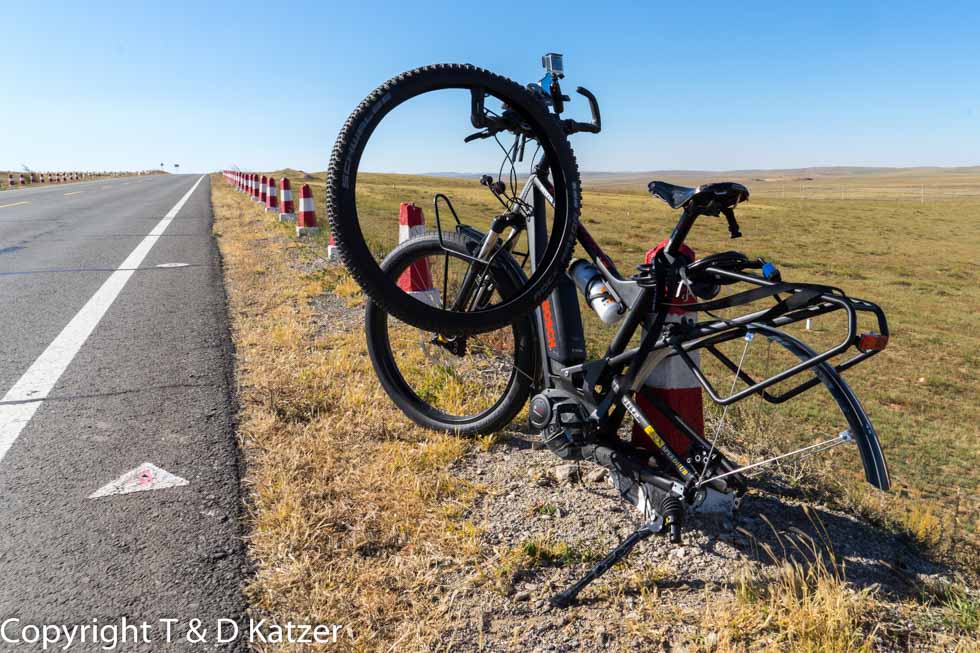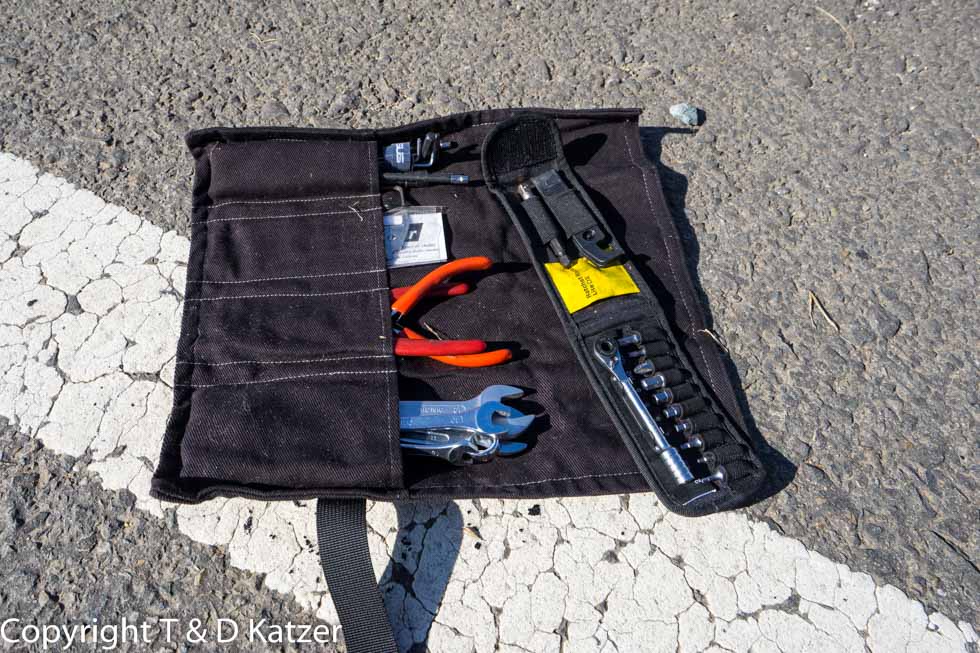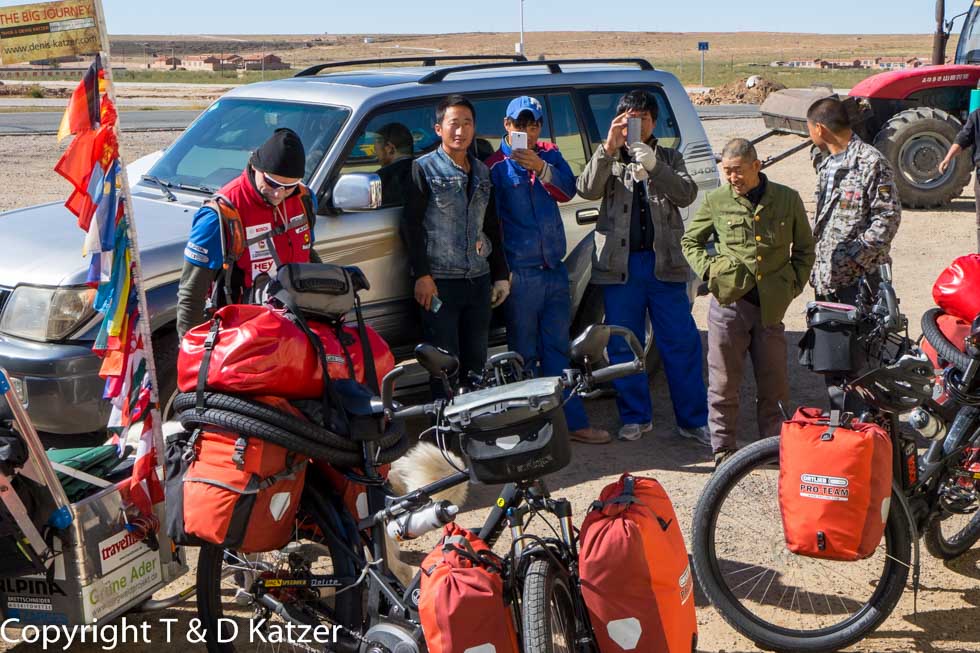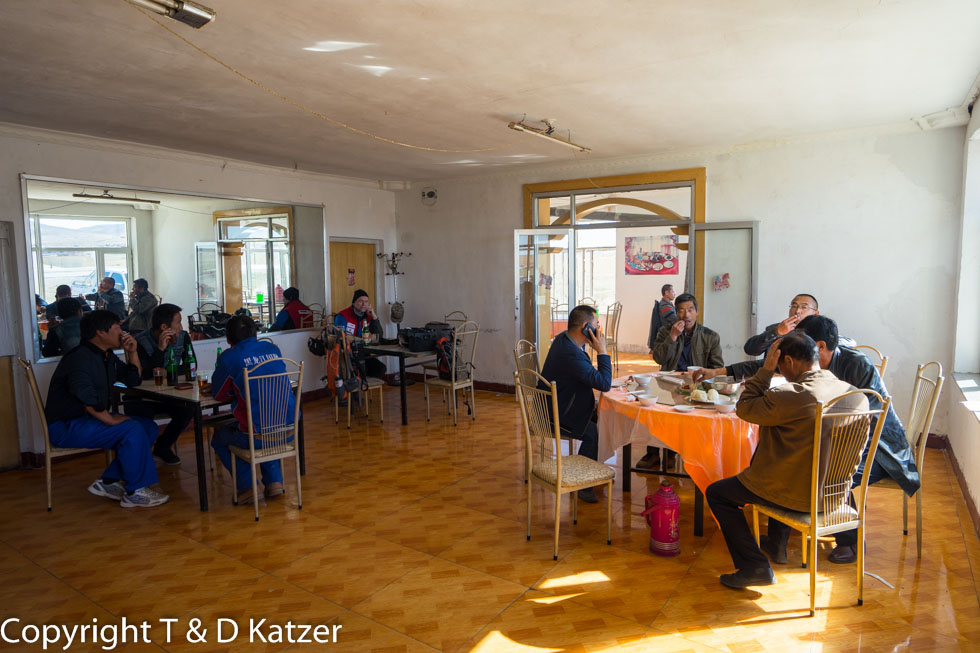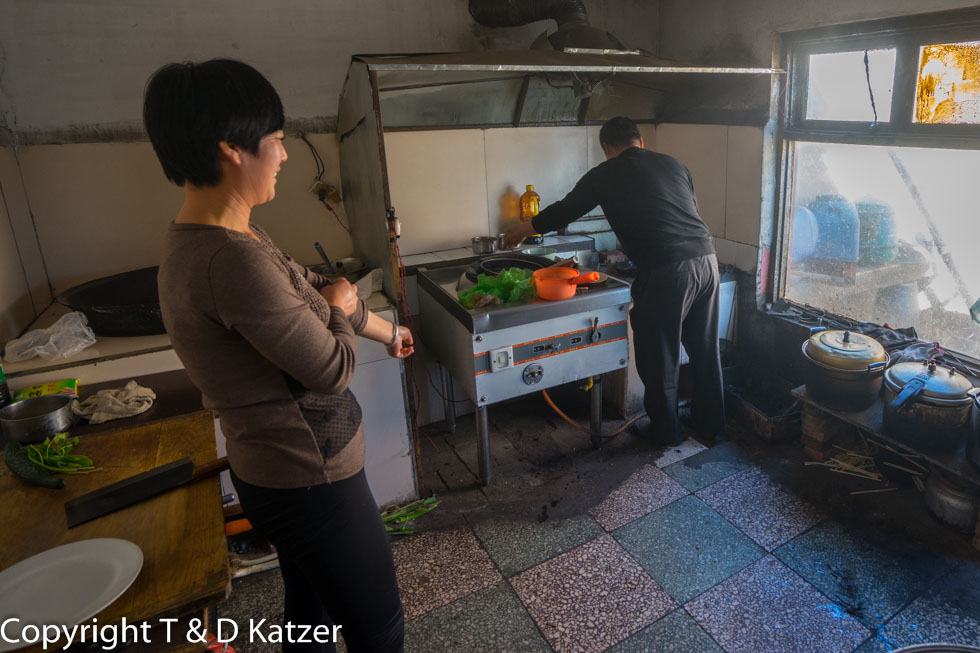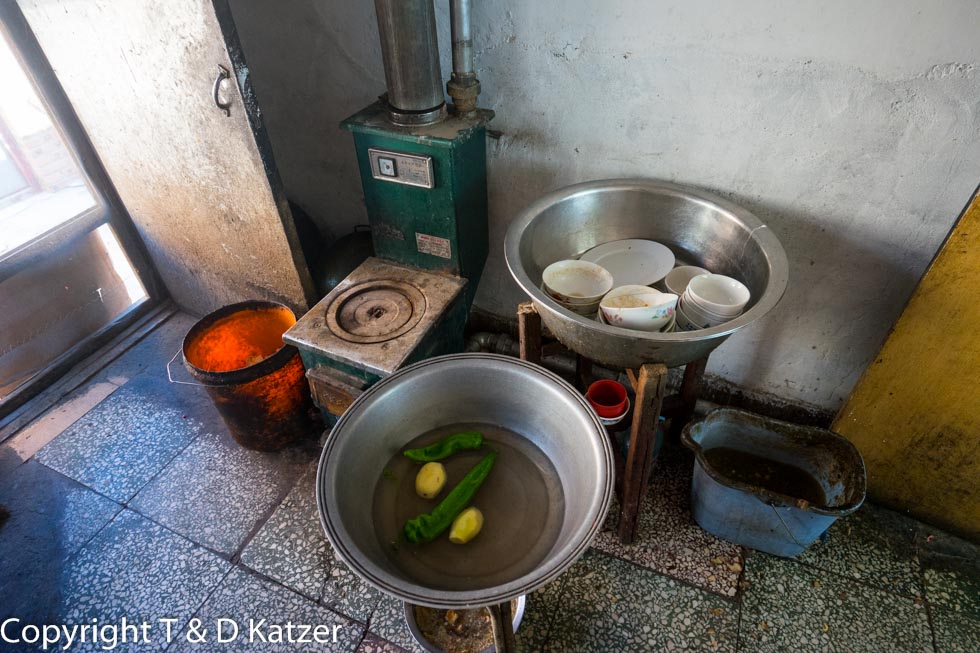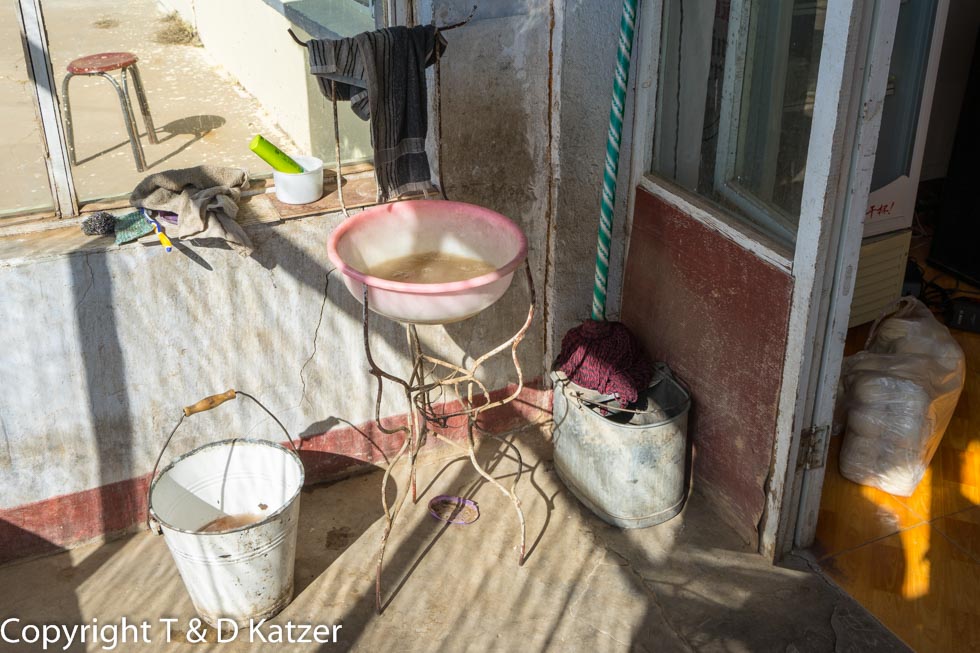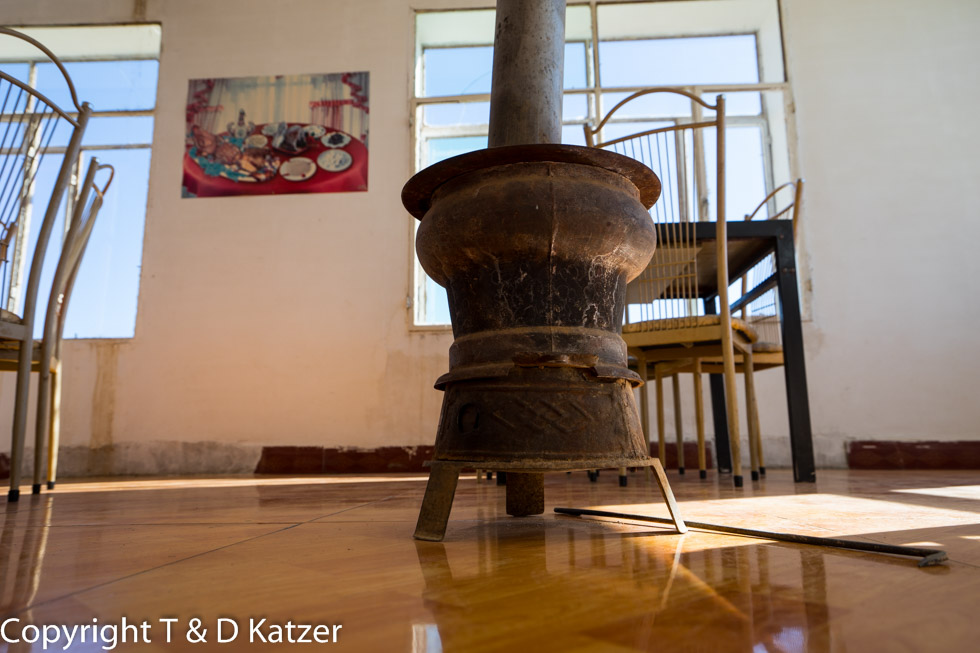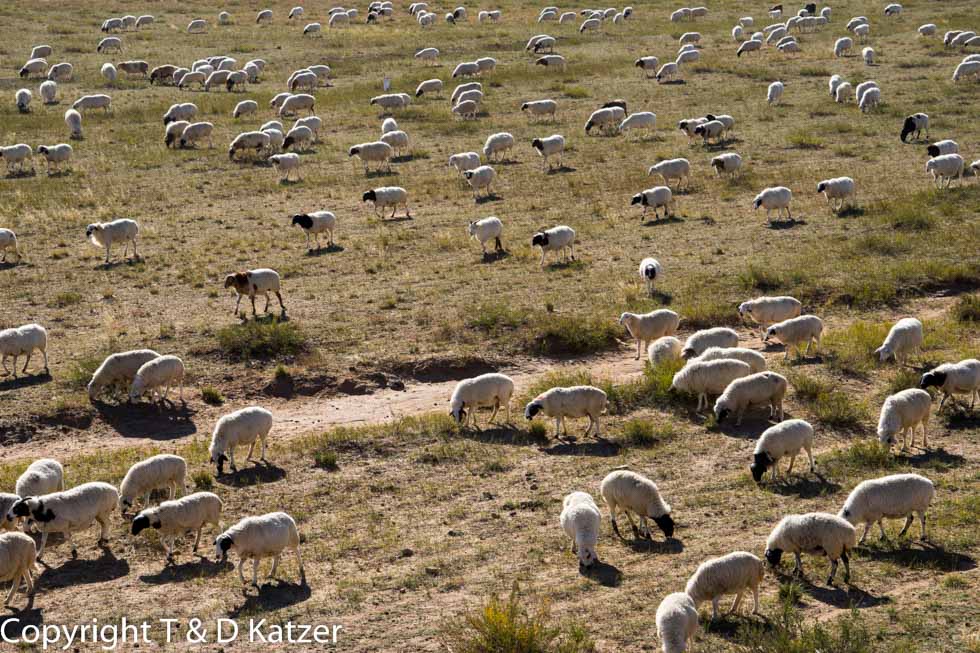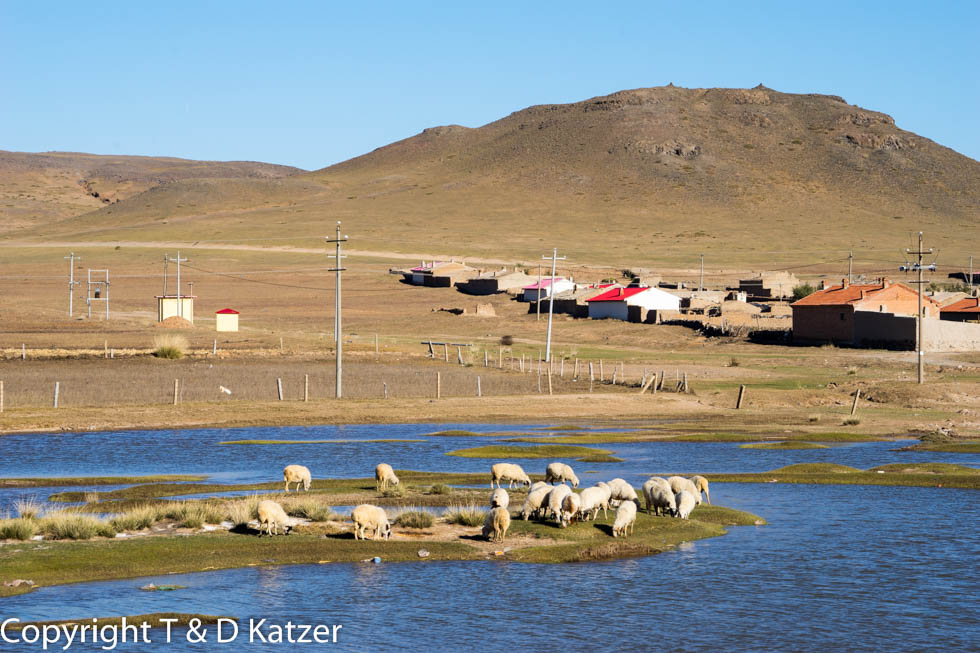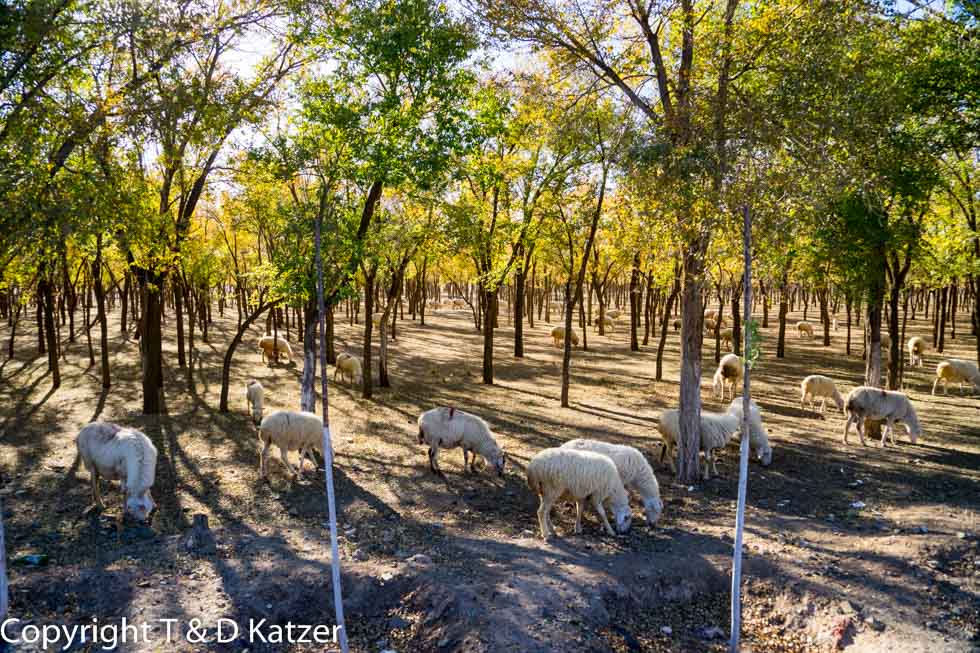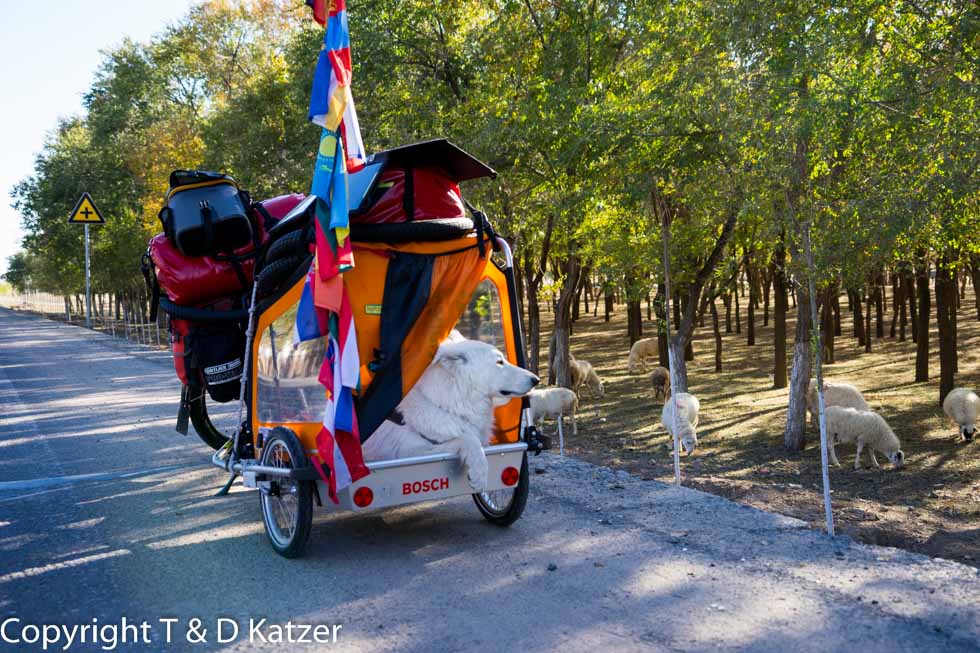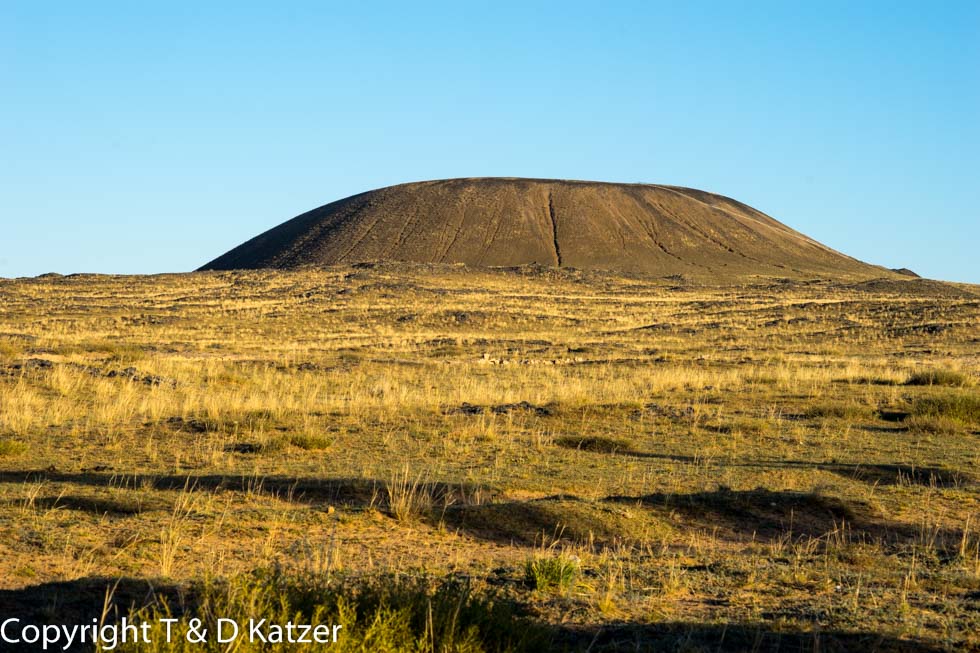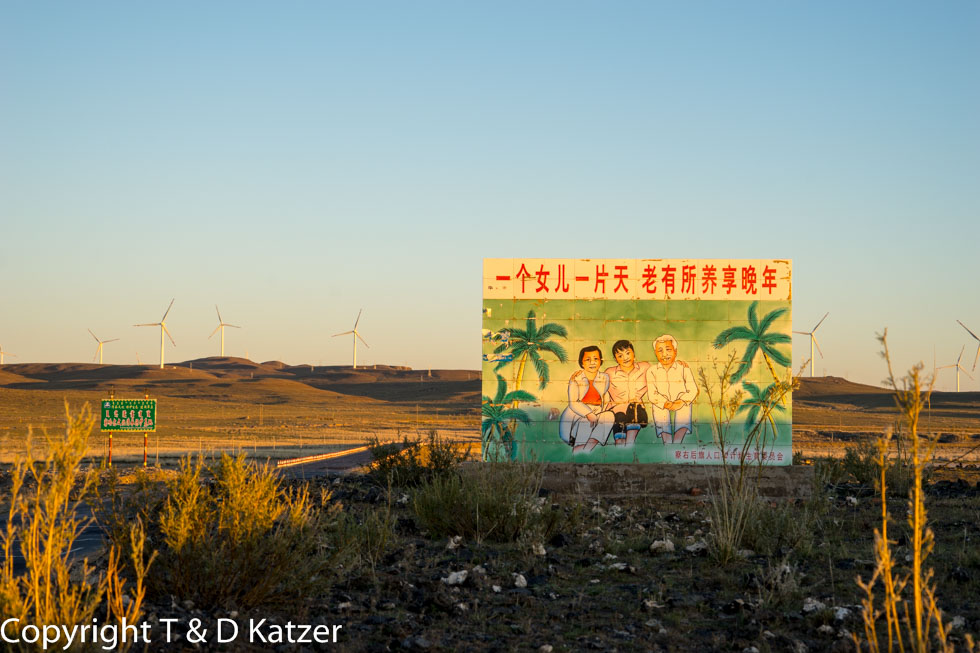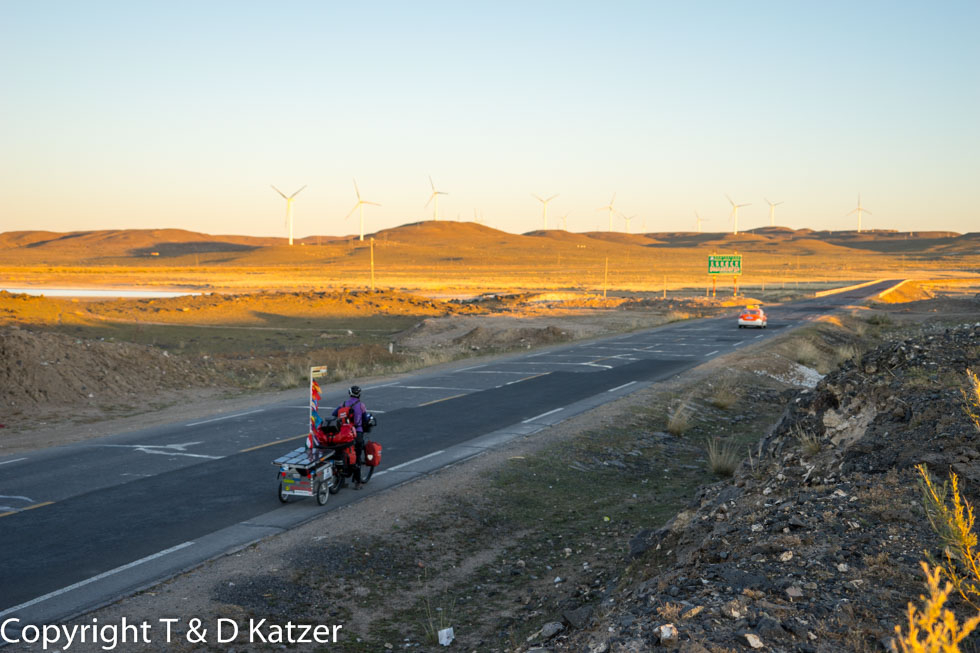
Explosion
N 41°26'22.0'' E 113°10'16.6''
Date:
12.10.2015 to 13.10.2015
Day: 106 – 107
Country:
China
Location:
Baiyinchagan
Latitude N:
41°26’22.0”
Longitude E:
113°10’16.6”
Daily kilometers:
119 km
Total kilometers:
9,663 km
As the crow flies:
110.57 km
Average speed:
22,5
Maximum speed:
54.1 km/h
Travel time:
5:25 hrs.
Soil condition:
Asphalt
Maximum height:
1.499 m
Total altitude meters:
4.940 m
Altitude meters for the day:
410 m
Crosswind Wind force: 5
40 km/h
Tailwind Wind force: 5
40 km/h
Sunrise:
06:34 a.m. – 06:35 a.m.
Sunset:
17:54 – 17:52
Temperature day max:
12 °C
Temperature day min:
0 °C
Night temperature:
minus 1 °C
Departure:
09:00 a.m.
Arrival time:
6:15 pm
Total plate tires:
8
Plate front tire:
2
Flat rear tire:
5
Plate trailer tire:
1
(Photos of the diary entry can be found at the end of the text).
The sun rears up again against the coming winter. It is decidedly warmer and a blue sky promises a wonderful day on the bike. The only downside is that the wind no longer blows at our backs, but at our sides. We say goodbye to the friendly hotel staff. They stand in front of their workplace and wave after us. At the end of Baiyinchagan, the Gobi Desert suddenly becomes hilly. The strong westerly wind and the ups and downs cost a lot of battery energy. If the wind situation doesn’t change during the course of the day, we won’t manage the 119 km ahead of us. Although I should have gotten used to the battery situation over the last few months, it still stresses me out to be left without power. Good energy management is and remains important for this tour. The elements, the nature of the land, the road and our mental and physical constitution all play an important role. It is undoubtedly a challenge with our limited range to get through such a lonely country. Being naive and relying on your luck would simply doom an e-bike rider. I am absolutely certain that in a few years, our current challenges of limited range will be history. Battery capacity will continue to improve in the future. Then energy management will no longer have the importance it has for us on this tour. Even if I would like to have 5000 watt batteries to be less dependent on constant charging, there is a certain appeal and adventure in that. Even now, having to recharge has taken us to interesting places and experiences that we would not otherwise have seen and experienced. So everything fits as it is. This is one of the most important life lessons for us anyway. We humans often want something different, something better, we are not satisfied with the status quo of the moment, even though everything is basically perfect. Striving for more and better brings us nothing except a considerable amount of dissatisfaction. “Wuuummm!!!”, an explosion goes through my limbs and suddenly the thoughts of charging the batteries, the crosswind, the hills that have appeared, are gone. My bike immediately starts to wobble. I brake and come to a halt without falling off the bike. “What was that loud bang?” asks Tanja, who has brought her road train to a halt behind me. “It tore the rear tire,” I reply, stunned. “How can that happen?” “I wish I knew,” I reply and start to unload my bike. “It’s a good thing you haven’t just roared down a mountain,” says Tanja. “That’s right,” I reply thoughtfully, because if something like that had happened at 50 km/h, I would undoubtedly have gone off. “Under no circumstances should you drive down a hill that fast again,” she admonishes me. “Yes, yes, I’m driving in a controlled manner,” I say sourly about the unexpected stop. The cold west wind makes me shiver as I work. Fortunately, today is a sunny day. At the border camp I had filled my rear tire with puncture foam as a test and was sure that it couldn’t go flat. Well, this new flat tire proved me wrong. I put on one of the new coats that Riese und Müller and Schwalbe had sent us to Erenhot. Now the last tire has been replaced by the new delivery. “What are you doing there? We have to keep going,” says Tanja as I kneel in front of my rear wheel and stare at it. “I wonder why it tore the hose. That’s not a normal flat tire. I inflated the Rock Razer to 3 bar. Previously I only had 2.5 bar in it. Although 3.5 bar is permitted, that could have been too much pressure for the load. Anyway, now the new tires are on. They are more stable and can withstand 4 bar. At 3 bar, they shouldn’t be too full,” I think aloud to myself.
A while later, the wind turns and fortunately blows at our backs from the northwest. We make good progress, which gives us hope of reaching our destination today without any difficulties. Unexpectedly, the first Chinese roadside restaurant on this route appears. We stop for lunch and park our bikes in front of the simple house. A few truck drivers immediately rush out of the restaurant to take photos of us with their cell phones. As if we were rock stars, they constantly hold their devices on us. We have a friendly laugh and greet the men, who are no longer shy about filming the cyclists from every conceivable position. The restaurant is very busy. As we enter, the people there stop eating and stare at us. We greet them with “Ni hao” (good afternoon), whereupon everyone laughs enthusiastically and repeats our obviously funny Ni hao in chorus. As soon as we sit down, we pull out our cell phones and start taking photos and videos. We are amazed. The last time we had experienced something like this was over 20 years ago, when we crossed Pakistan 1,500 km by camel or when we traveled through India for 1 ½ years on a Royal Enfield, an old British motorcycle replica. Except that there were no cell phones back then. “We ask if we can charge our batteries. That’s no problem here in China either. The innkeeper immediately shows me the socket. Because the menu is written in Chinese, I go into the kitchen and point to what we would like to eat. The cook nods eagerly and in a very friendly manner. It doesn’t take long and we are eating delicious vegetables cooked in a wok and a few freshly made mantou (steamed buns). An hour later, we click the handlebar bags back in and say goodbye. “Why is the dog trailer so close to your rear tire?” wonders Tanja as I sit in the saddle. “What?” I ask, startled, dismount and take a look. I immediately break out in a sweat. “I don’t believe it,” I say for the second time today, stunned. “What is it?” “Well, it looks like the new drawbar has been completely bent. It’s unusable.” “It’s unusable?” “Absolutely. Look at this. The tube hasn’t bent in height this time, it’s compressed.” “How can that happen? The roads in China have been fantastic so far.” “Oh man, will it never end? Now we have two broken drawbars. I don’t understand that for the life of me. We’re 20 kg under the maximum payload and we’ve just traveled 50 km with it. That’s just not possible!” “I think you should put the old drawbar back in,” Tanja suggests. “I guess we have no other choice. The only question is how long it will last and where we can get a new one. If it only lasts 50 km, we don’t need to have one of these sent to us again.” “Maybe we can have it modified in a workshop?” “Phew, I don’t know what will come out of that with my language skills. We’ll end up with a coffee maker on it,” I joke. “We’ll find a solution. Now let’s get going. We still have 70 km to go today.” “Okay,” I reply and pedal off, lost in thought.
The landscape changes abruptly. An extinct volcano rises from the earth, lava rock and volcanic ash make the region more fertile. Suddenly fields and trees line the straight road. Apparently we have crossed a weather divide. A swarm of small midges, which have not yet been killed by a night frost, sticks to our faces. “There are still flies!”, I cheer and for the first time on a bike trip I am happy to have swallowed these little insects. The chirping of some bright, funny sparrows also gladdens our hearts after we haven’t heard or seen any birds for a long time. More and more settlements appear. Poor-looking farmers separate the wheat from the chaff by throwing the harvest into the air with a shovel. When we cycle past them, they stop and can’t believe what aliens are gliding through their village. We wave and earn friendly, open laughter. There is hustle and bustle everywhere. The roads are being paved with kerbstones, houses are being built and the squares in front of the houses along the road are being poured in fresh concrete in all the villages we pass through.
The sun has already set as we roll into the small town of Baiyinchagan after 118 km. It is quite chilly at around 0 °C. We are exhausted from the long day. The first cars drive with their lights on. As everything is written in Chinese, we don’t have the slightest idea where to find accommodation here. The uncertainty of whether we will find anything gnaws at us. We are guided by instinct. Tanja laughs and, as so often, is confident. We turn right at a set of traffic lights. It’s a hive of activity there. The sensation is huge. People stop everywhere and look towards us. Some seem to fall into a kind of rigidity. Who would have thought to experience something like this in China. Surely one of the last countries in the world where a European is so conspicuous, especially when he comes along on colorful bikes with monster luggage. At a house that looks like a hotel, I ask. “No, that’s not a hotel. There in the side street,” points out a Chinese woman. Tanja asks two boys on an electric scooter if they can show us the way. They immediately race ahead of us. It is already dusk when we reach a large area where countless trucks are parked. There is life here too. There is shunting and honking. Chinese neon lettering shines brightly from the various buildings. “Here it is,” say the boys and glide silently away on their electric scooters. “That’s where the hotel is,” says a truck driver and sends us in the wrong direction. We turn around, stand in front of a house and one of the simple restaurants. A man points to the next door. “This is supposed to be a hotel?” I ask myself. Exhausted, we place our trestles on the stands. While Tanja looks after her, I enter the house. As soon as I am enveloped by its warm interior, I discover the modern lobby. I came in through the back entrance. Everything looks perfect at the front. “Can we book a room?” I ask with the help of my phrase book. I won’t mention the bikes and the dog for now. The woman at reception smiles shyly at me and reaches for the phone. It only takes minutes when a Chinese man appears who speaks some English. I have to hand in our passports. “You are welcome to stay overnight with us,” says the equally friendly manager of the hotel. “Uh, there are still two bikes and trailers outside. They need to go inside. Can we put them under the stairs?” The manager thinks for a moment: “No problem sir.” “Great! Very good.” “Uh… we also have a dog. He has to come in too,” I chatter as if it were the most normal thing in the world, praying I won’t meet with rejection. “What? You have a dog?” comes the horrified counter-question. “Yes,” I reply with a cheerful smile, even though my pulse is beating up to my neck. Please dear God, let our Ajaci in there. I don’t fancy having to drive through a Chinese city in the cold again in search of a place to stay. “No. Dogs are not allowed in my hotel,” it hits me. “Our dog is very sweet. He doesn’t bite or bark,” I try to convince him and also show these sentences in Chinese. “How big is your dog?” “Not that big,” I say, waving my outstretched arms, showing off half his actual size. “Come on. He’s outside. You’ll like him,” I try to convince the manager again. He finally softens and follows me to the truck parking lot. Tanja greets the man in a very friendly manner. When he sees Ajaci in his trailer, he looks in horror at a large white dog. “He’s really lovely. You can stroke him,” says Tanja. The manager stands there, thinking hard. “Oh, that’s very kind of you. Thank you so much. You know, we’re very tired and appreciate your hospitality,” Tanja chats away even though the man hasn’t made a sound yet. “All right, then. You can take him into the room,” the wonderful words leave his mouth. “You did a great job,” I whisper to Tanja as we unload the bikes. As soon as there are a few bags on the stairs, the manager and the woman from reception immediately help to carry them inside. After Tanja has brought Ajaci and a few bags into the room, she appears again. “But that took a long time?” I wonder. “The room is on the fourth floor, but I don’t care today. Under the circumstances, I would have carried her to the eighth floor,” she says, relieved to know that she has a place to stay for the night.
“Have they eaten yet?” the manager is concerned, after he has helped me bring the bikes and trailers inside and stow them under the stairs. “No, but we’re very hungry,” I reply. “There’s a good little restaurant next door,” he recommends. “A thousand thanks and thanks again for letting us stay,” we say. “You’re welcome,” he replies with a mild smile.
Because there are so many stories that I want to get out of my head and into the computer and Tanja feels pain in her left knee, we decide to rest for a day tomorrow…
The live coverage is supported by the companies Gesat GmbH: www.gesat.com and roda computer GmbH www.roda-computer.com The satellite telephone Explorer 300 from Gesat and the rugged notebook Pegasus RP9 from Roda are the pillars of the transmission.
